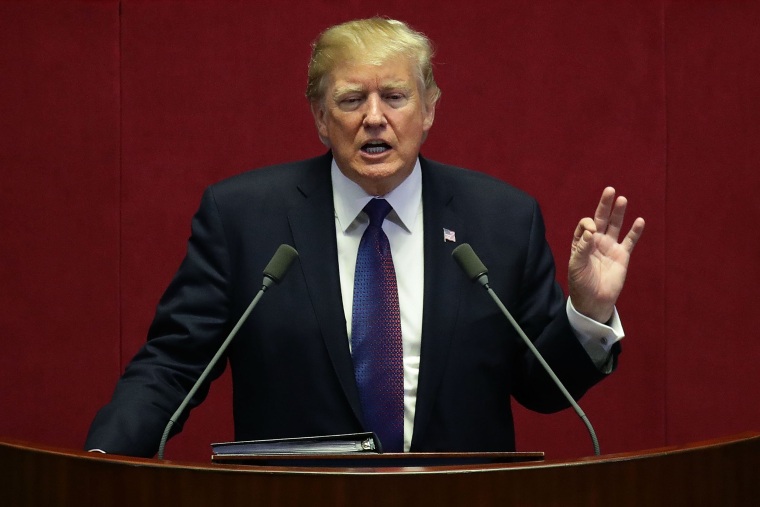SEOUL, South Korea — While Donald Trump has been praised for sticking to prepared remarks on his Asia trip rather than lashing out with potentially dangerous verbal attacks against North Korea’s leader Kim Jong Un, a key speech in Seoul was not the address the president had initially wanted to give.
A top U.S. official with direct knowledge of the Asia trip told NBC News that Trump had initially wanted to deliver a message of strength that Kim Jong Un — and his Chinese and occasional Russian backers — could not ignore.
“The president doesn’t want war,” the official said. “But he wants to show strength. It’s about projecting power, to send a message to the region that the U.S. backs its allies, and stands up to threats in a way that’s unlike previous administrations.”
To make that point, Trump had intended to give a 35-minute speech to South Korea's National Assembly that more directly criticized the North Korean regime. Asked who persuaded the president to ease up on the rhetoric, the source told NBC News, “Let's say it was a group effort.”
He declined to elaborate on what specifically was “toned down.”
White House aides, according to the source, said they failed to convince the president to drop references to golf in the speech, including a plug of his own golf course. In a lengthy aside, Trump praised South Koreans for their apparent national prowess at the sport.
“The women's U.S. Open was held this year at Trump National Golf Club in Bedminster, New Jersey, and it just happened to be won by a great Korean golfer, Sung Hyun Park, and eight of the top 10 players were from Korea," Trump said.
"And the top four golfers — one, two, three, four — the top four were from Korea. Congratulations. Congratulations. Now, that's something. That is really something,” he added.
"We’ve got a president of the United States who is publicly taunting and mocking a 33-year-old squirrely dictator with a nuclear program"
Retired U.S. Army Gen. Barry McCaffrey, who has worked on North Korea strategy for decades, said there was "an element of disbelief" among many who had experienced combat at close range that Trump dealt with such serious issues so lightly.
“This is a dangerous situation for the United States and our allies," he said. "Where is the diplomatic intervention?”
Trump's visit to the region comes amid rising tensions and after a summer of hot rhetoric from Trump who promised to meet provocations from North Korea with "fire and fury."
North Korea has conducted about 20 ballistic missile tests this year in defiance of U.N. resolutions, including two intercontinental ballistic missile tests that experts said suggest that a missile could reach parts of the United States. On Sept. 3, Pyongyang conducted its sixth nuclear test.
High-risk brinkmanship
It was no accident that Trump arrived in Asia backed by an armed flotilla at sea and while fighter jets buzzed over the Korean Peninsula.
A senior U.S. official and a retired U.S. military official briefed on policy told NBC News that Trump is engaged in brinkmanship with North Korea to show strength and encourage the regime's backers to use their leverage over Pyongyang. But critics say the strategy is unlikely to persuade the Kim regime to abandon its nuclear arsenal and that it also carries the risk of triggering the deadliest conflict since World War II.
McCaffrey, who said he now estimates the chances of conflict with North Korea to be around 51 percent before next summer, called Trump's influence on the process "destructive."
Related: Where Did Trump’s Use of ‘Rocket Man’ Come From?
"It’s pushing us towards a position where a North Korean provocation in response is more likely than not — a very dangerous situation for the U.S. to be in,” he said. “We’ve got a president of the United States who is publicly taunting and mocking a 33-year-old squirrely dictator with a nuclear program, and Kim Jong Un cannot look weak in front of his generals. They’ll murder him.”
He added: “If the president keeps taunting him with 'little rocket man' and an implication of U.S. nuclear preemptive strike on North Korea, at some point, [Kim] will say, 'Let’s fire 200 artillery rounds into Seoul,' and tell the Americans, 'Now we want to talk.'"
Suzanne DiMaggio, a senior fellow at the think tank New America, agreed.
“This is how we stumble into war,” said DiMaggio, who has engaged in diplomatic back-channel negotiations with North Korean officials. “President Trump probably has access to CIA psychological profiles of Kim Jong Un, and I'm sure it probably says somewhere in that profile, probably in red letters, 'Do not insult this person. He has a personality where these sort of insults will not go — he will respond to them.'"
So far on his Asia trip Trump has not called Kim "rocket man," but the president has issued sweeping threats against the North Korean regime, called Kim a dictator, and accused him of murder, torture and enslaving his own people.
“History is filled with discarded regimes that have foolishly tested America's resolve,” Trump said in Seoul. “Anyone who doubts the strength or determination of the United States should look to our past, and you will doubt it no longer.”
Retired Adm. James Stavridis, a former NATO supreme allied commander, said he shares the concern that threats backed by arms could trigger an exchange of fire that could spin out of control.
“Two leaders yelling at each other in an immature fashion sends signals to their militaries that could lead to a fighter pilot doing something he should not, an artillery commander doing something he should not, a submarine commander doing something he should not," he said. "And that small incident in the context of this kind of inflammatory rhetoric on both sides is the most likely path to a full-blown war.”

